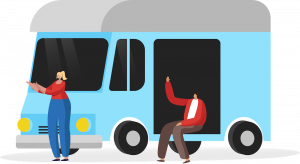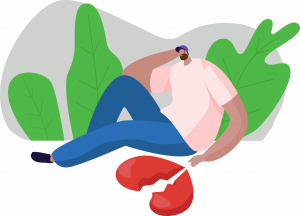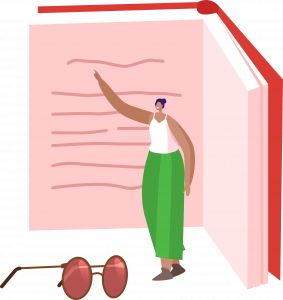My name is Hayley and I’m an Outreach Officer for the WAAC Needle and Syringe Exchange Program (NSEP).
I spend four days a week hanging out on our NSEP van, distributing fits (sterile syringes) and spending time with the lovely people that use the service. In all honesty, my job is mostly chatting, laughing and sharing stories with people. I love it! 
One of the most notable things about working on the NSEP van is that every day is so different.
Sometimes people will come to sit and yarn with us about something funny that has happened to them that day. Sometimes people may be experiencing a crisis and need a cry or a number to call for help. Sometimes people will share with us that they are having a rough time; that they have lost a friend, lost a child to the system, or feel alone, angry and upset.
People share with us stories of the families that have turned their backs, the loved ones that keep them afloat, the systems that call them names, and the internal voice that often cuts the deepest.
Many career choices take more of a scientific or solution-focused approach; things that cannot be measured are seen as subjective and ‘problems’ need to be ‘fixed’.
What I love about mine is that concepts such as love, loss, grief and struggle are encouraged and openly discussed. People that access our service are recognised as complex beings with emotions, experiences, and strengths.
At WAAC, we get a glimpse into the range of the human experience, and I feel so truly lucky to be able to be a part of it.
The weight and expanse of stigma
Unfortunately, a common experience we hear is that of stigma. Stigma is the set of negative and usually unfair beliefs that a society holds about a group of people. It has a detrimental impact on a person’s mental health, self-esteem and relationships.
As well as this, stigma can impact people’s ability to access services, receive adequate support, manage stress, and can contribute to a reduced life expectancy.

Stigmatised groups of people are often not seen as real human beings with complex lives, but instead, as a stereotype; influenced by things such as the media, political ideologies and preconceived ideas.
Stigma can manifest in numerous ways, including social exclusion, denial of employment or housing, becoming a victim of violence, and inadequate access to health care due to the stigmatising beliefs that become ingrained in broader health systems. As well as the influence this has on healthcare engagement, it can also strongly impact a person’s sense of identity.
The negative and unfair connotations around drug use can saturate society’s thoughts and feelings towards individuals that use drugs, causing other elements of their identities to be completely overlooked.
Stigma can then very easily become internalised, causing people to develop a negative sense of self.
The Veil of Ignorance
There is a moral tool created by philosopher John Rawls called the ‘Veil of Ignorance’ that can promote ethical decision-making when faced with situations where stigma, discrimination or inequality may be at play. Simply, this is what it means:
If you could redesign society, what would it look like? Who would have access to wealth and power? Who would be in charge? Would everybody be equal? How would you define equality? Who would be able to access welfare? Who would be granted the most opportunity to succeed? How would women be treated? How would Aboriginal people be treated? How would people that use drugs be treated? How would people living in poverty be treated?
Now, ask yourself those questions again, but imagine that you do not know who you will be in this society. You have not yet been assigned a gender, a socioeconomic status, a sexuality, a race, a job, or any past experiences that impact your treatment by society.
When any choice you make could either benefit or harm you, how do you think this would impact the way that you design your society?
The Veil of Ignorance challenges our cognitive and unconscious bias and forces us to consider other people’s positions and experiences with compassion.
How we can challenge stigma
While it feels impossible to tackle this worldview, here are a couple of things that we can do to challenge stigma:
Consider your language
Language is the primary tool for expression and communication. It can help us to understand ourselves, each other and the world around us. Language can perpetuate stereotypes and create negative or positive connotations about groups of people. 
Person-first language is a technique that puts the individual before their circumstance. Instead of ‘drug user’, we say ‘person that uses drugs’.
People have many other elements of their identities that don’t include their use of drugs, so we feel it to be important not to reduce people to one thing.
Call out stigmatising views when you hear them
It may not be easy or comfortable but calling out your mates on their stigmatising language or attitudes can be really effective and is really important. If not you, then who?
Challenging your friends and sharing your views is actually really healthy in a friendship and can allow your mates to see a side to the story that they may have never considered.
Know the facts
Did you know that the Department of Health found that alcohol is the drug that causes the most harm in Australia?
The drugs that the public perceive, and media negatively portray as being the most ‘dangerous’ are often not accurate.
Arming yourself with evidence-based information and facts is a great way to contribute to challenging stigma. You can check websites like the National Drug & Alcohol Research Centre.
If you want to know more about the NSEP or you simply want to know more about what we do at WAAC, check out our NSEP page or give us a call on (08) 9482 0000.
Hayley is an NSEP Outreach Officer for WAAC.
